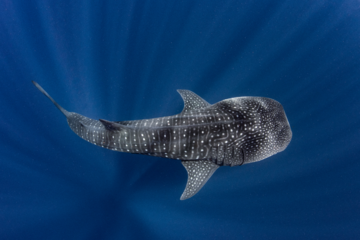Sharks are unquestionably among the fascinating aquatic animals. However, even among shark types, there are numerous distinctions worth considering.
Both great sharks and whale sharks belong to the category of sharks. However, there are wide differences among them, ranging from their appearance, habitat, diet, and so on. Also, while one is considered to be highly aggressive, the other is non-aggressive and does not pose any threat to humans.
It is worth noting that although we associate sharks with attacks and bloodshed, it is not always the case. And the comparison between great white sharks and whale sharks will prove it aptly.
This informative post will detail the nitty-gritty of both species of sharks. Then, we will focus on some frequently asked questions regarding great white sharks and whale sharks.

Great White Shark vs. Whale Shark: Basic Comparison
While we’re in the frequently asked questions, here’s a quick rundown of some fundamental knowledge regarding great white sharks and whale sharks.
| Comparing Parameters | Great White Shark | Whale Shark |
| Scientific name | Carcharodon carcharias | Rhincodon typus |
| Family | Lamnidae | Rhincodontidae |
| Genus | Carcharodon | Rhincodon |
| Distribution | Saltwater | Warm waters |
| Weight | 4000 lbs | 21.5 tons or 43000 lbs |
| Length | 20 feet (approx.) | Up to 40 feet |
| Swim speed | 25 mph Short bursts of 35 mph | 3 mph |
| Diet | Stingrays, turtles, sea lions, seals, and other smaller sharks | Filter feeders |
| Noise Making | No | No |
| Bite force | 4000 pounds per square inch | They do not bite or chew |
| Danger to humans | Most likely | Not likely |
| Lifespan | Up to 70 years | May live up to 150 years |
Great White Shark vs. Whale Shark: Weight
The most famous sharks are large. However, amongst them, some are humongous and fall under the category of largest fishes in the world.
Whale sharks are large and weigh way more than great white sharks. That said, the former can weigh up to 21.5 tons, while the latter stands at 4000lbs (approx.). In other words, a whale shark can weigh equivalent to a school bus. So, it is needless to state that whale sharks win the race in terms of weight.
Great white sharks have gained more attention than whale sharks; they are definitely not the heaviest ones.
Great White Shark vs. Whale Shark: Size
Great sharks are unquestionably part of the huge shark family. On the other hand, their size is vastly different from that of whale sharks. Let’s have a look.
Great white sharks can reach a length of 20 feet (approx.). Therefore, these sharks fall into the category of middle-sized sharks. On the other hand, Whale sharks can grow to be 40 feet long (approximately), which is twice the size of great white sharks. Furthermore, it’s also been discovered that the largest whale sharks can grow up to 60 feet long.
It’s worth noting that whale sharks are classified as the world’s largest fish or sharks. Yet, despite their enormous size, these sharks are known as gentle creatures.
Great White Shark vs. Whale Shark: Look

Appearance is among the first few things that make it easy to distinguish between a great white shark and a whale shark. So let’s delve deep into the matter.
A great white shark resembles a torpedo with its sharp head and wedge-shaped tail. They also have a whitish underside and a dark blue topside. On the other hand, a whale shark has a flat head, trimmed snout, a huge mouth, and blue-black coloration. Whale sharks also have distinct spot markings and keels (ridges of hard tissue) that make it possible to identify individual sharks.
So, the appearance of these two types of sharks is pretty different and unique. Even if one is not aware of intrinsic features, only one look at these sharks is sufficient to distinguish them from each other.
Great White Shark vs. Whale Shark: Teeth
Teeth play a prominent role in the life of a shark. Shark teeth are unique and help in grabbing and devouring the prey. But not all these fishes possess sharp teeth.
Whale sharks, like basking sharks, lack sharp teeth. These fish are filter feeders but have 3,000 tiny teeth less than an inch and help them bite plankton, crustaceans, and small fish. On the contrary, great white sharks have 300 sharp triangular teeth designed to pierce and rip through the skin of their prey.
The possession of sharp and serrated teeth helps great white sharks stay at the top of the list of predators. They are considered as one of the apex predators of the marine world and pretty aggressive.
Great White Shark vs. Whale Shark: Bite Force


Arturo de Frias Marques (CC BY-SA 4.0) from Wikimedia
Every animal that possesses teeth has a bite force of some extent. Sharks, in this regard, have some of the highest bite forces in the animal kingdom. But can the same be stated for all types of sharks?
Great white sharks have sharp teeth that can have a bite force of 4000 pounds psi. As a result, great white sharks are really good at biting prey or things, and they are even better at piercing through the body of their prey with the utmost bite force. On the contrary, whale sharks do not use their teeth to bite or chew their food, so their bite force doesn’t count.
Whale sharks have a large mouth that they open to let water in, and their bodies filter out food before returning the water and any debris to the ocean.
Great White Shark vs. Whale Shark: Aggression
Sharks and aggression go hand-in-hand as per usual perception. And, due to the depiction of these fishes in pop culture, this perception has gained momentous.
In terms of aggression or wild behavior, whale sharks score much less than great white sharks. Great whites are considered one of the three most aggressive shark species, along with bull sharks and tiger sharks. On the contrary, whale sharks are docile and often allow swimmers to touch and ride them.
Also, whale sharks do not hunt viciously as great white sharks. Since these fishes are filter feeders, they roam around the water surface for food. However, great white sharks hunt lonely and can easily attack unprovoked.
Great White Shark vs. Whale Shark: Habitat
The habitat of great white sharks is different from whale sharks. So let’s give it an in-depth look.
Although they can travel to bays and ports, great white sharks are primarily found in seawater. As a consequence, they have the ability to travel long distances, like from California to Hawaii. Whale sharks, however, are more common in tropical and warm-temperate environments. In addition, they are usually pelagic and prefer to live in the open sea because they graze on plankton.
It’s also worth noting that both of these fishes can be found at great depths in the ocean. Whale sharks, for example, can dive to depths of 1000 meters, whereas most great white sharks are found at 0- 1200 meters.
Great White Shark vs. Whale Shark: Lifespan
Sharks are one of the oldest living beings on earth, and generally, they have a lifespan between 20- 30 years (average). However, some differences exist between different shark species.
Great white sharks live for about 70 years on average. However, because these sharks develop late and have small litters, their population growth is slower. In this aspect, whale sharks outlive great white sharks, living up to 150 years. However, only 10% of whale sharks make it to full growth.
Great White Shark vs. Whale Shark: Predators
There is no doubt that sharks are considered predators of oceans. However, these predatory fishes also have their predators.
Since great whites sharks are one of the three most aggressive shark species, they do not have any worthy natural predators, except for orcas. Nonetheless, threats from humans are worth to be noted. Similarly, humans also pose as predators for whale sharks.
The reality is that human actions threaten the whole shark species. These fishes are hunted and killed for their meat, oil, fins, etc. Even if not purposefully, many sharks, including whale sharks, are accidentally caught due to by-fishing or are hurt due to vessel strikes, etc.
As a consequence, many shark species have been categorized as vulnerable.
Will great white sharks and whale sharks eat each other to win a fight?
Whale sharks are counted as the biggest fishes on earth. They are massive but docile, while great whites are comparatively smaller but highly aggressive.
Whale sharks are filter feeders so they won’t eat away great white sharks in a fight. Although, on the other hand, great whites can hunt down and eat smaller and younger whale sharks, it is less likely that they would eat an grown whale shark to win a war.
Here, it should also be remembered that great white sharks will bite what they can chew. So, great white sharks are less likely to waste their energy on a much larger fish than them. However, you may never know, but they may lash out at whale sharks if they feel threatened.
Summary
Both great white sharks and whale sharks are versatile. They are unique and differ from each other in many respects. That being said, mature great whites can prey on young and juvenile whale sharks. However, it may not be possible for these fishes to win over fully grown whale sharks. Whale sharks are too big and weight for great white sharks to handle.





